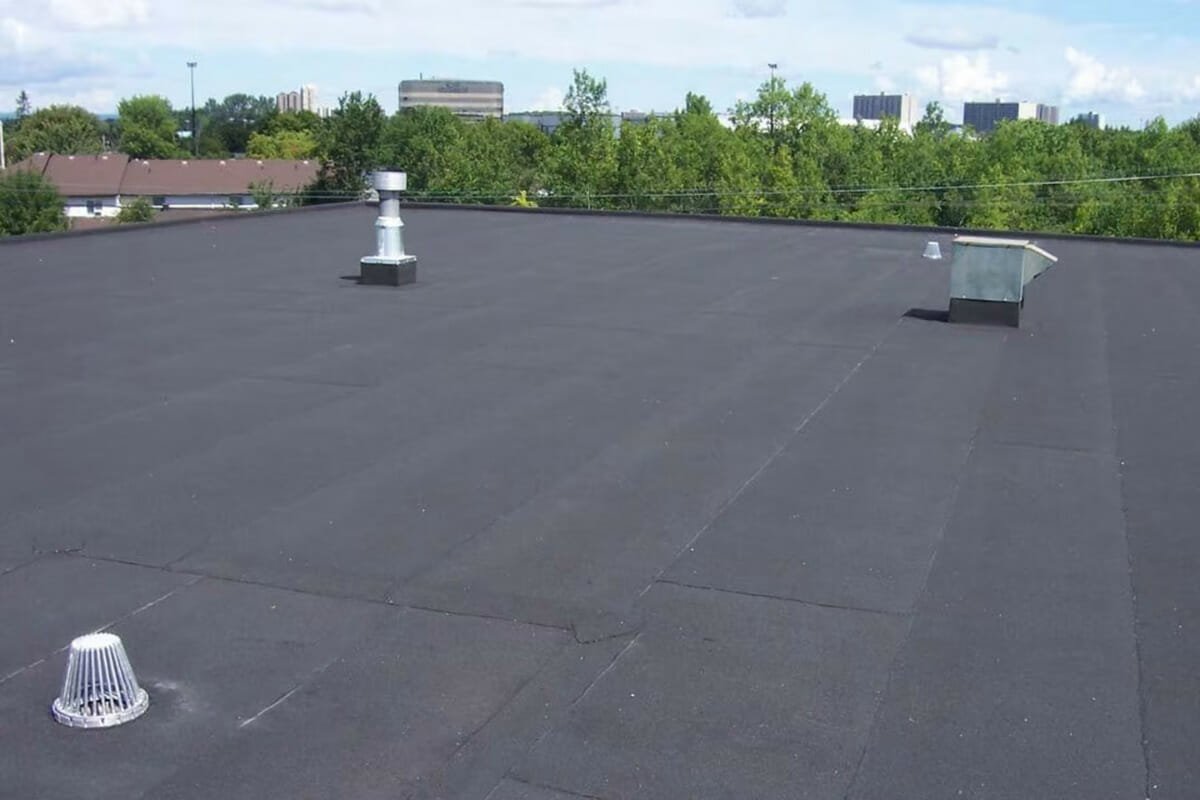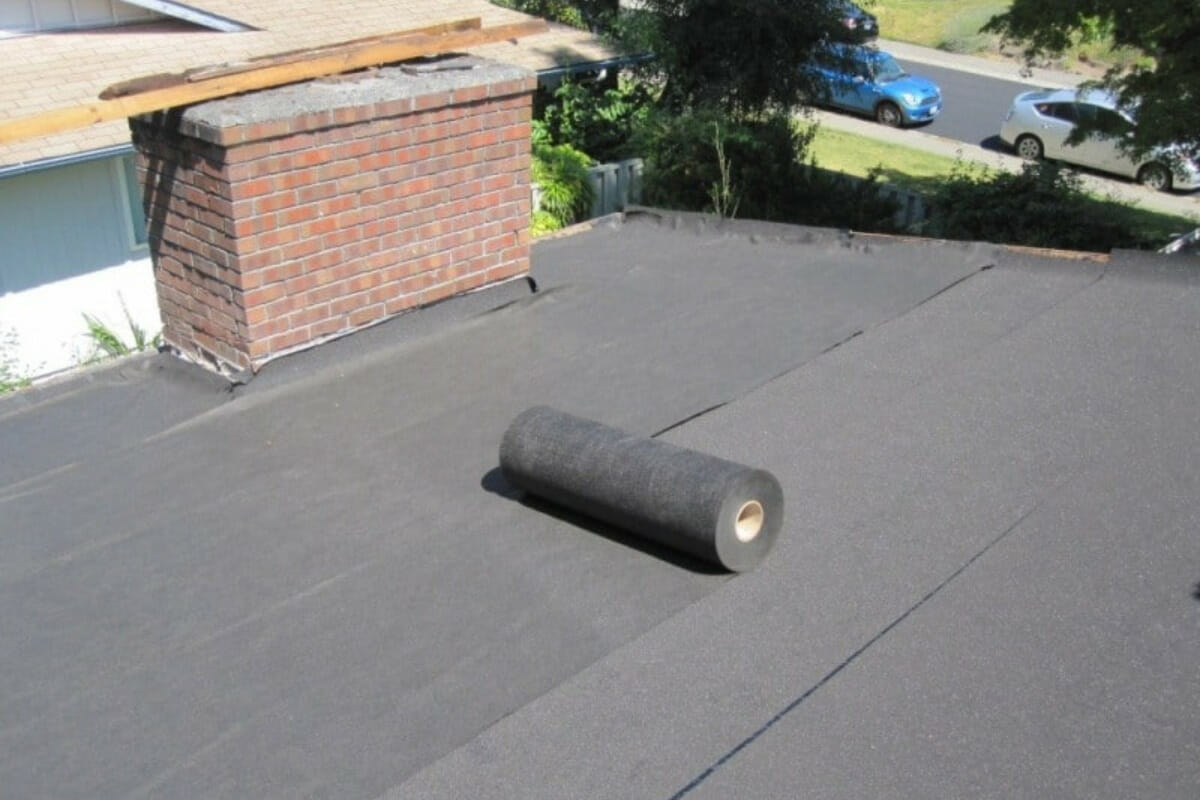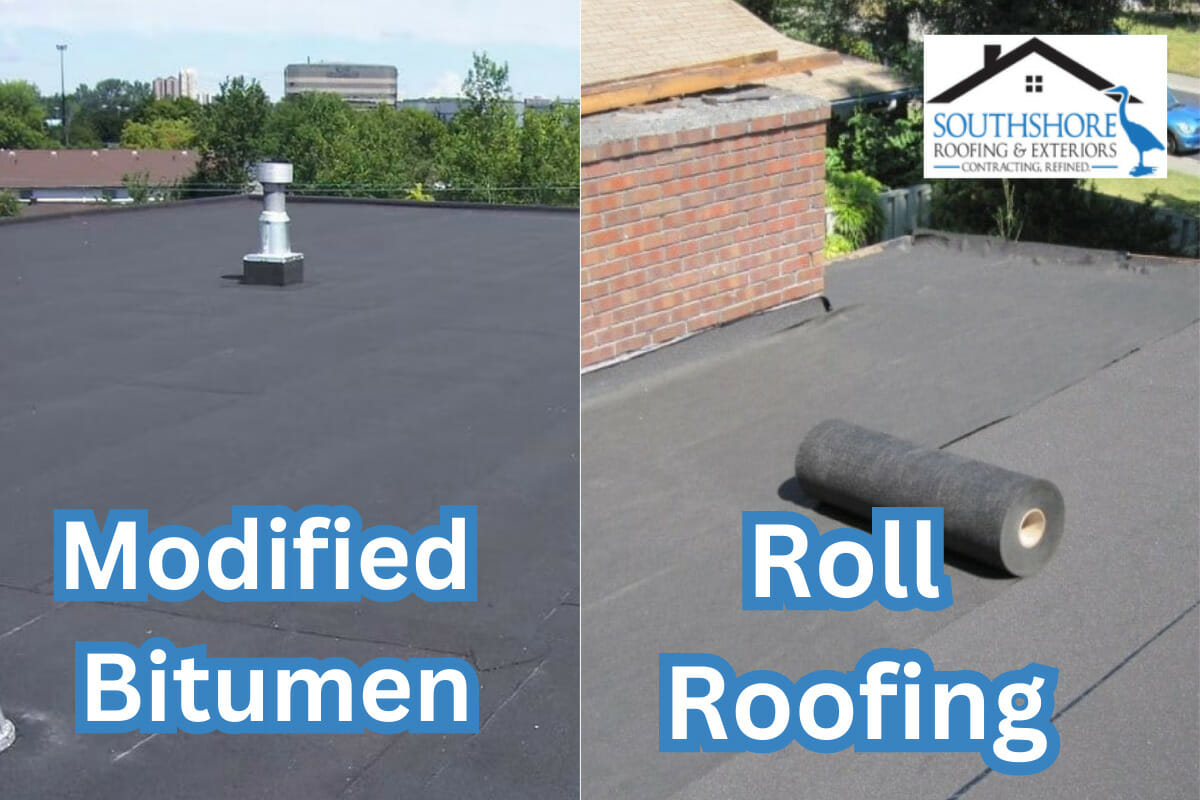Gone are the days when flat roofing systems were only seen on commercial spaces. Due to their several advantages, many homeowners are now choosing a flat roof design for their homes. This has sparked several debates on the types of flat roofing materials available in Florida and which one will suit your property best.
We know that roofing materials may not be the first thing on your mind when envisioning your dream home, but they play an instrumental role in the protection and appeal of your property. From the scorching heat of summer to the chill of winter, the roof is your home’s first line of defense. When contemplating a roofing project, two contenders often stand out. In the sections below, we will compare modified bitumen vs. roll roofing systems, so you can make the right decision.
Modified Bitumen: Unveiling the Versatile Contender
What is Modified Bitumen?
Modified bitumen, often referred to as mod bit, is a high-performance roofing material that has gained popularity for its versatility and durability. It’s an evolution of traditional asphalt roofing, enhanced with polymer modifiers that bolster its strength and resilience. This material is a great choice for both residential and commercial roofing projects, offering a range of benefits that cater to various needs.
Composition: Reinforced Asphalt Sheets
At its core, modified bitumen is composed of reinforced asphalt sheets. These sheets are fortified with modifiers like APP (atactic polypropylene) or SBS (styrene butadiene styrene), which endow the material with remarkable elasticity and resistance to temperature fluctuations. These modifiers allow the roof to stretch and contract with the changing seasons without losing its protective durability.
Pros Of Modified Bitumen
There are several benefits of a modified bitumen roofing system, including the following:
Long Lasting Material
A modified bitumen roof is quite durable, it can last for more than 20 years with ease. The material is flexible yet sturdy. Its reinforced asphalt composition, combined with polymer modifiers, grant it superior durability and the ability to withstand harsh weather conditions, including heavy rain, hail, and high winds.
Excellent Waterproofing
The multiple layers and sealed seams of modified bitumen provide exceptional waterproofing, minimizing the risk of leaks and water damage. This is particularly beneficial for areas prone to heavy rainfall.
Cons Of Modified Bitumen
Weight Considerations
Depending on the specific type and installation method, modified bitumen roofing systems can be relatively heavy. This may require additional structural support, especially for older homes.
Environmental Impact
While modified bitumen has made strides in terms of eco-friendliness, it may not be as environmentally sustainable as some newer roofing options that prioritize green materials and energy efficiency.

Roll Roofing: The Optimal Opponent
What Is A Roll Roofing System?
Roll roofing or roofing rolls, as the name suggests, come in large rolls and are often used for low-sloped roofs. It’s a cost-effective option that appeals to homeowners seeking a straightforward solution. Typically, a roll roofing system is composed of materials like asphalt, fiberglass, or felt saturated with asphalt. For this reason, it is also known as an asphalt roll roofing system.
Material Composition and Variants
A roll roofing system offers a few material variations, each with its own strengths. The most common type is asphalt roll roofing, which consists of an asphalt-saturated base covered with mineral granules. These granules not only provide aesthetic appeal but also aid in shielding the roof from UV rays. Another variant is the fiberglass roll roof, where a fiberglass mat serves as the core reinforcement.
A roll roofing system is a budget-friendly roofing option and comes with its own set of advantages and disadvantages. Let’s delve into the pros and cons to help you make an informed decision for your roofing project.
Pros Of A Roll Roofing System
Affordable
A roll roofing system presents a compelling budget-friendly option, particularly suited for homeowners with financial constraints or those seeking short-term roofing solutions. Its cost-effectiveness allows for effective protection without breaking the bank, making it a pragmatic choice for those prioritizing economic considerations in their roofing decisions.
Speedy Application
This flat roofing option is not only cheaper but can be installed faster as well, letting you focus on other tasks. Its efficient installation process, facilitated by its large sheets and straightforward techniques, accelerates project timelines. This swift application not only ensures prompt roof coverage but also reduces interruptions to your daily activities. For those seeking a prompt roofing solution, the expedited installation of roll roofing can be a significant advantage.
Cons Of A Roll Roofing System
Limited Lifespan
A roll roofing system’s durability falls short compared to more resilient flat roof options. Its lifespan ranges from 10 to 15 years at best, necessitating more frequent replacements. Most asphalt roll roofing systems last for less than 10 years.
Vulnerable to Extreme Conditions
Roll roofing faces similar issues to the ones that asphalt shingles face. Harsh weather conditions, such as heavy rains or severe hail, can challenge a roll roof’s protective capabilities. Hail stones or other heavy impacts can cause the roll roof to puncture and develop gaps, increasing the risk of damage.
So now you have seen that there is one common thing between these two materials: asphalt. But despite this similarity, the two roofing types are very different.
So which one comes out on top? Let’s summarize the debate.

Modified Bitumen vs. Roll Roofing: The Final Word
Lifespan
Modified bitumen stands out for its impressive longevity, with a lifespan of 20 to 25 years. This is quite good when compared to other flat roofing materials.
In contrast, a roll roofing system falls short in the durability department, offering a modest lifespan of 10 to 15 years at best. While budget-friendly, the material’s shorter lifespan means more frequent replacements and potential maintenance issues.
Winner: Modified bitumen
Cost Analysis
When deliberating roofing options, cost plays a pivotal role in the decision-making process.
Modified bitumen roofing systems often require a higher upfront investment due to its advanced materials and installation techniques. However, this cost can be justified by its extended lifespan, potentially mitigating long-term expenses through reduced repairs and replacements.
Roll roofing systems shine in terms of affordability. With lower material and installation costs, it’s an attractive option for homeowners seeking a budget-friendly solution. While the initial investment is lower, it’s important to weigh this against the material’s comparatively shorter lifespan and potential maintenance needs.
Weather Resistance
When it comes to weather resistance, both modified bitumen and roll roofs have their unique strengths.
Modified bitumen takes the spotlight with its exceptional waterproofing capabilities. The multiple layers and sealed seams create an effective barrier against rain, snow, and moisture. This makes it a good choice for places like Tampa, where the weather can turn quickly. Also, due to their weight, these roofs can handle an average amount of foot traffic pretty well.
A roll roofing system, while not as water-resistant as modified bitumen, still exhibits commendable wind and weather resilience. These roofing systems are also more vulnerable to weathering issues such as cracking and temperature changes.
Winner: Modified bitumen
Aesthetic Appeal
When it comes to enhancing your home’s curb appeal, modified bitumen offers a wide spectrum of design possibilities. This versatile roofing material is available in various colors, patterns, and textures, allowing you to tailor your roof’s appearance to complement your overall architectural vision. However, the aesthetic appeal is still less when compared to other materials such as a metal roof.
On the flip side, roll roofing systems present some constraints in the realm of aesthetics. While it provides a functional roofing solution, its design options are comparatively limited.
Winner: Modified bitumen
Conclusion
Ding, ding, ding! I think we have a winner in the modified bitumen vs. roll roofing system debate. As you can see, the modified bitumen roof scores well on all platforms. It is much more durable than its counterpart, and can also last longer.
Asphalt roll roofing systems lack a bit in these departments. However, it is the cheaper option of the two materials, and you should consider it if you are on a tight budget.
Are There Any Other Alternatives?
The two roofing materials that we covered today are very popular flat roofing materials in Tampa, but if these are not for you, take a look at these other materials:
➡️ EPDM
➡️ TPO
➡️ PVC
➡️ Metal
Best Flat Roofing Services In Tampa, FL
If you are impressed by modified bitumen, a roll roofing system, or are looking for another roofing material for your flat roof, then you can turn to the team at SouthShore Roofing & Exteriors. We are the best commercial roofing company in Tampa, FL. Whether you need a flat roof repair or want to install a whole new roofing system, our experienced professionals are just a call away.
So what are you waiting for? Contact us today at 🏠📞 (813) 400-3329 📞 🏠 to book a free consultation and to clear all the doubts you may have about your upcoming roofing project.




